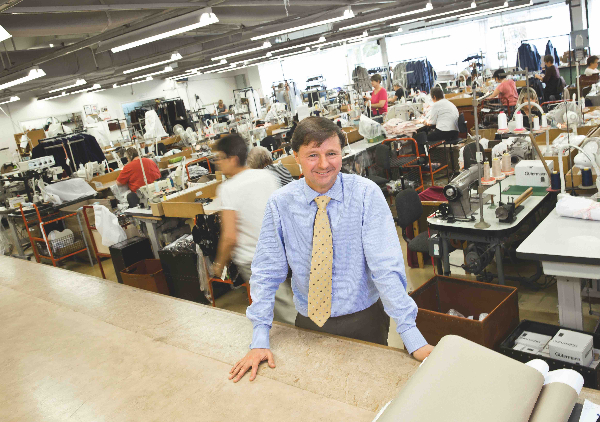
David Nieper boss calls for renewed pride in British manufacturing
Posted by: Laura Hammond
Mon 13th March 2023
The chief executive of Alfreton’s David Nieper has shared his hopes for a renewed pride in British manufacturing.
Christopher Nieper OBE calls for a celebration of ‘Brand Britain’ in a bid to boost the economy and bring industries back to local communities like ours in Alfreton.
His company designs and manufactures women’s clothing here – even the cotton used by the firm is printed a dyed in Alfreton.
In a piece published by the Daily Mail, Christopher calls for legislation to protect products made in Britain, citing a similar law in Switzerland.
He says: “Now that Brexit has freed us to set our own laws, why can’t we have a Britishness legislation like the Swiss – our very own ‘Toblerone Mark’?
“The UK fashion industry is worth £26 billion a year to the economy, but only three per cent of the clothes we wear are made here.
“It is vital that the Government protects Brand Britain by enforcing the country of origin rule in the clothes we sell. For a garment to be described as ‘made in Britain’, at least 50 per cent of its value should have been added in the UK.
“The benefits to Britain’s flagging economy would be enormous. A Britishness law, like Switzerland’s Swissness law, would boost exports, create jobs and foster a pride in our industry not seen since the Industrial Revolution.”
Christopher believes that British manufacturing is the secret to the success of David Nieper, which he says will see a 15 per cent jump in sales this year compared to 2022.
He says: “By keeping production at home and close to our customers – two-thirds of whom are in the UK – we can eliminate supply chain problems, bottlenecks and delays, prevent overstocking and reduce waste, which is kinder on the planet.
“We have previously bought fabrics offshore, but the shipment arrives six months later. Now, once our UK sample team have designed something, our pattern-cutters sit in the same room so they can instantly tell us if it can be made in a different way.
“It is a more nimble way to production, where the designers can create new tailoring or other alterations mid-season if they find a certain design isn’t selling well, or is generating a high number of customer returns. We even have our own sewing school on site, to counter the challenge of finding and retaining staff with the specialist skills we need.”
You can read the full article here.
Community
Cultural celebration at the Meadows
Cost of Living
Get out this Summer for just a £2 bus fare
Crime & Policing
Police offer Bike Safe courses across county
Education & Skills
Student conference focuses on careers in the NHS
Health & Wellbeing
Taking time out to relax at support charity
History & Heritage
Civic visit at Derbyshire heritage site
Local Government
Councillor completes marathon in the capital
Top Stories
Farewell to former choir member
Youth Zone
Getting creative with film-making
